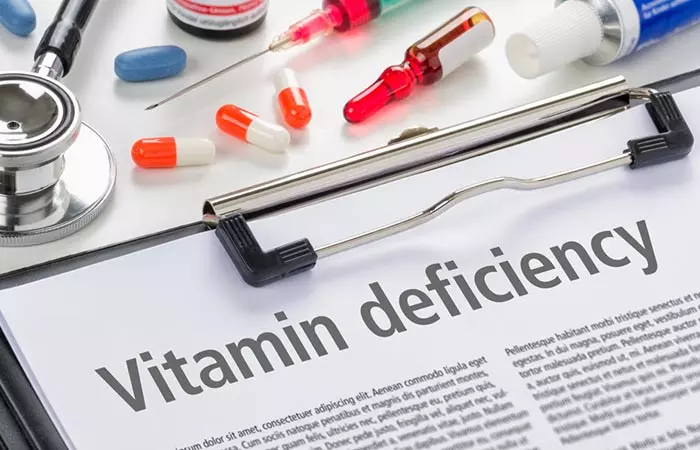GM Diet Side Effects – 11 Hidden Risks Of The 7-Day GM Diet
There are several reasons why nutritionists do not endorse this diet.

Image: ShutterStock
The GM diet helps you lose weight rather quickly. In fact, it helped the employees of General Motors to lose 17 lbs within seven days. But how many of you are aware of the hidden side effects of the GM diet? Certainly not many! This article brings you the 11 untold dangers of this diet. Take a look!
In This Article
Does The GM Diet Have Any Side Effects? What Chrissy Arsenault, RDN, Says
According to Chrissy Arsenault, RDN, “The GM diet is a seven-day diet plan that emphasizes specific food groups on each day, with the promise of weight loss. However, since it restricts certain food groups, it is not a nutritionally adequate diet for the long term. It may be easy to lose weight initially, but it’s not a sustainable way to meet your needs. For your body to function properly, you should aim to get foods across all groups: whole grains, fruits, veggies, and dairy (or dairy alternatives) without restricting foods. This ensures that you get all your vitamins, minerals, and macronutrients that your body needs.”
Let us now delve into the drawbacks of this diet.
Key Takeaways
- General Motors weight loss diet is not scientific and not recommended for pregnant women, breastfeeding women, diabetics, and people with eating disorders.
- General Motors diet causes nutritional deficiencies leading to slow metabolism, brain fog, weakness, headaches, mood swings, and hair loss.
- General Motors diet causes dehydration and lowers exercise performance.
- Consult a doctor or dietician before getting into this routine to avoid severe health issues.
11 Side Effects Of The GM Diet
1. Is Not Scientific
There are no scientific studies that prove that the GM diet is an effective weight loss plan. The diet is not recommended by registered dietitians and doctors and it is best to dismiss it as a fad diet. The employees of General Motors went on this diet for 7 days and shed their weight quickly. But the lack of scientific evidence and support makes the GM diet questionable.
The GM diet plan claims to help you lose up to 15 pounds, i.e., 6.8 kg, in just 1 week, though there is no scientific evidence for the same.
2. Restricts Nutrition

The GM diet is a severely restricted diet designed for rapid weight loss. It is not only a very low-calorie diet but also forces dieters to restrict food groups like whole grains and protein. Whole grains are good sources of dietary fiber, vitamins, and minerals (1). Proteins help improve satiety and prevent muscle loss (2), (3). Restricting these food groups makes the GM diet highly imbalanced and may result in hunger pangs and nutrient deficiencies.
3. Is Unsustainable
Each day, the dieters consume any one of these: fruits, veggies, bananas and milk, or soup. This lack of variety in food makes it monotonous and unsustainable. A weight-loss diet needs to be sustainable and palatable to be successful. Diets like the Mediterranean diet and intermittent fasting are effective, flexible, and sustainable and aid weight loss.
4. Slows Down Metabolism
Consuming very few calories over a prolonged period causes metabolism changes, which in turn can cause slow metabolism. Following the GM diet with restricted food options and nutritional deprivation affects the normal metabolic rate (4). Metabolism slowdown leads to fat storage and eventual weight gain instead of weight loss.
5. Causes Brain Fog

Inability to focus, think clearly, and memory loss are symptoms of brain fog. Nutritionally deficient and restricted low-calorie diets, like the GM diet, may cause brain fog (5). According to anecdotal evidence, some people might experience dizziness, low blood sugar levels, and malnutrition. It disbalances hormones and shuts the body processes down to preserve energy for survival. As a result, the brain stops functioning normally.
6. Can Lead To Muscle Loss/Weakness
Following the GM diet for a prolonged period may cause muscle loss. This is because the GM diet is low in calories and does not allow exercising. Doing exercises like cardio and strength training every alternate day can help you lose fat and preserve/build lean muscle mass (6). Not exercising at all causes muscle weakness, muscle loss, joint pain, and deteriorates heart and lung health.
7. Can Cause Poor Exercise Performance

Exercising helps improve stamina, flexibility, balance, endurance, and muscle power. Not exercising for even three days causes a “muscle disuse”. This means your muscles start to lose their ability to contract and relax fast (7). Not exercising for seven days while on a low-protein, low-calorie diet, affects exercise performance, strength, stamina, muscle power, and balance.
8. Can Cause Headache And Mood Swings
Hunger may affect the body and brain (8). Low-calorie, low-carb, and low-protein diets, like the GM diet, cause frequent headaches, irritability, and mood swings.
A blogger described their experience of following the GM diet for 7 days in their blog post. They experienced weight loss but also severe headaches during this diet. They said, “I felt that headache returning to me by evening. I experienced a fleeting sensation of fainting problem (i).”
9. Causes Dehydration
The GM diet causes metabolic slowdown. The amount of fluid through food, juices, and water are rapidly used up to enhance the metabolic rate. As a result, dehydration and constant thirst kick in. Dehydration further slows down metabolism and also causes dry skin.
10. Can Cause Hair Loss

Another side effect of the GM diet is hair loss. The GM diet is low in protein (the main building block of hair) and nutritionally deficient (like vitamins and minerals that are required for strong hair) (9). Being on the GM diet for more than a week (if you can sustain it) causes hair fall, dull hair, and may even stall hair growth.
11. Is Not For Everyone
The GM diet is not for everyone. Pregnant women and children should steer clear of the GM diet. People with normal BMIi A measurement of body fat based on the height and weight of an adult individual. A BMI calculator can help you achieve a healthy weight. should also opt for diets that are not so restrictive. People with diabetes, hypoglycemiai It occurs when a person’s blood sugar level falls below normal. Also known as low blood sugar. , heart problems should avoid the GM diet.
The GM diet, though potentially effective in the long run, can cause some serious side effects. But there could be times when you may want to be on the diet. Here’s what you can do to manage the side effects of the GM diet.
 Quick Tip
Quick TipHow To Manage The Side Effects Of The GM Diet?

- Get a customized GM diet chart from a registered dietitian.
- Drink water to stay hydrated.
- Consume omega-3 and multivitamins after consulting your dietitian.
- Ensure you do not follow the diet for more than a week.
- Do yoga stretches to prevent “muscle disuse”.
- Get back to working out slowly.
Infographic: 5 Side Effects Of The GM Diet Everyone Should Know About
While the GM diet is popular among people for losing weight, there are a lot of hidden risks associated with it that you may not be aware of. If you are planning on starting this diet to shed some calories, it is better to be informed about its side effects. Check out the infographic below to know more.

Illustration: StyleCraze Design Team
The GM diet is one of the fastest ways to lose weight, but the results come at a cost. Yes, there are quite a few side effects of the GM diet owing to the highly restricted low-calorie, low-carb, and low-protein intake. People on this diet may fall short on their nutrient intake, which may lead to muscle loss and hair loss, among other side effects. Very limited intake of food may also slow down metabolic ratei It indicates the number of calories a body needs to function while at rest. Also known as the basal metabolic rate. and reverse weight loss while also impacting optimal functioning of the brain. So, consult a doctor/dietitian before starting this diet to limit these adverse effects.
Frequently Asked Questions
What should I do if I experience side effects on the GM diet?
If you experience any side effects while following the GM diet, it is important to listen to your body and stop the diet immediately. If you notice any common side effects, such as fatigue, headaches, dizziness, and irritability, discontinue the diet. If you experience any severe side effects, such as chest pain or difficulty breathing, seek medical attention immediately.
Is GM diet harmful?
Yes, in the long run, being on the GM diet is harmful. The diet causes nutritional deficiencies, metabolic slowdown, brain fog, dehydration, muscle loss and weakness, and mood swings. Pregnant women, children, people with heart disease, diabetes, and hypoglycemia should avoid the GM diet.
Can I cheat in GM diet?
The GM diet is highly rigid and restrictive. If you cheat on the GM diet, you may not achieve the desired weight loss and might have to start over from day 1.
Can I exercise during GM diet?
No, the GM diet does not allow exercising. It is a low-calorie diet, and doing vigorous exercise may cause fatigue and weakness.
How does the GM diet impact digestion and elimination?
Anecdotal evidence states that once the GM diet is over, it may lead to decreased hunger levels, which may cause poor digestion. This may result in digestive issues like bloating and constipation.
References
Articles on StyleCraze are backed by verified information from peer-reviewed and academic research papers, reputed organizations, research institutions, and medical associations to ensure accuracy and relevance. Read our editorial policy to learn more.
- The role of whole grains in disease prevention, Journal of the American Dietetic Association, US National Library of Medicine, National Institutes of Health.
https://pubmed.ncbi.nlm.nih.gov/11478475/ - Protein, weight management, and satiety, American Journal of Clinical Nutrition, US National Library of Medicine, National Institutes of Health.
https://pubmed.ncbi.nlm.nih.gov/18469287/ - Preserving Healthy Muscle during Weight Loss, Advances in Nutrition, US National Library of Medicine, National Institutes of Health.
https://www.ncbi.nlm.nih.gov/pmc/articles/PMC5421125/ - Metabolic slowing with massive weight loss despite preservation of fat-free mass, The Journal of Clinical Endocrinology and Metabolism, US National Library of Medicine, National Institutes of Health.
https://www.ncbi.nlm.nih.gov/pmc/articles/PMC3387402/ - Nutrition, brain function and behavior, The Psychiatric Clinics of North America, US National Library of Medicine, National Institutes of Health.
https://pubmed.ncbi.nlm.nih.gov/6269100/ - Muscle growth and exercise, Critical Reviews in Food Science and Nutrition, US National Library of Medicine, National Institutes of Health.
https://pubmed.ncbi.nlm.nih.gov/2222798/ - Disuse-induced muscle wasting, The International Journal of Biochemistry & Cell Biology, US National Library of Medicine, National Institutes of Health.
https://www.ncbi.nlm.nih.gov/pmc/articles/PMC3856924/ - Mood disorders: A potential link between ghrelin and leptin on human body? World Journal of Experimental Medicine, US National Library of Medicine, National Institutes of Health.
https://www.ncbi.nlm.nih.gov/pmc/articles/PMC4436933/ - Diet and hair loss: effects of nutrient deficiency and supplement use, Dermatology Practical & Conceptual, US National Library of Medicine, National Institutes of Health.
https://www.ncbi.nlm.nih.gov/pmc/articles/PMC5315033/
Read full bio of Reda Elmardi
Read full bio of Arshiya Syeda
Read full bio of Aparna Mallampalli


























Community Experiences
Join the conversation and become a part of our empowering community! Share your stories, experiences, and insights to connect with other beauty, lifestyle, and health enthusiasts.